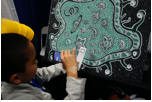|
Sound-Reactive Mesh Morphing Explorations in Real-time Mesh Generation in Unity3D |
|
|||
|
Purpose: Personal Project Team : myself Development: Topics: music visualization |
|
This is my exploration of generating and morphing 3D meshes. The meshes react to Fast-Fourier Transform analysis of real-time music. Current plans are to create a variety of shapes and place them in the user’s environment using augmented reality. Images : |
|
|
|
|
||||
|
Bacteria Snap An Augmented-Reality Game for Teaching Cell Biology |
||||
|
Purpose: For My PhD Research Team : 2 people My Roles: Project Lead, Lead Researcher / Designer / Developer Development: Topics: augmented-reality children education interaction techniques |
|
This game was built to test children’s ability to use different handheld augmented reality interaction techniques, and also to teach children about biology. Children learn about bacteria and antibodies through the matching of shapes. Traditionally performed within the confirms of the computer monitor, this simulation of cellular mechanics exists in the real world at a larger-than-microscopic scale. Although the interaction is physically-oriented, the interactions of the viruses and antibodies focused the learner’s attention on a simplified version of chemical bonding. This game was built on an early version of the ARGON AR browser (http://argon.gatech.edu) Presentations : Presented at the USA Science and Engineering Festival 2012 Images : |
||
|
|
|
|
||
|
Mountain Rescue An Augmented-Reality Game for Animal Ecology |
||||
|
Purpose: For My PhD Research Team : 2 people My Roles: Project Lead, Lead Researcher / Designer / Developer Development: Topics: augmented-reality children education interaction techniques user studies |
|
This game was built to test children’s ability to use different handheld augmented reality interaction techniques, and also to teach children about ecology. Children learn about ecological systems and animal habitats. The players are tasked with delivering lost animals to their preferred habitat. Virtual critters make for a much safer learning experience than real, wild animals! This game was built on an early version of the ARGON AR browser (http://argon.gatech.edu) Presentations : Presented at the USA Science and Engineering Festival 2012 Images : |
||
|
|
|
|
||
|
Spinspace + Spintopia: Studying Handheld-AR Interaction Techniques through Games |
|||
|
Purpose: For My PhD Research
|
In these two handheld augmented-reality games, children construct 3D structures using different interaction techniques on a phone touchscreen. Through interactions such as pushing buttons on a touchscreen, drawing tracks with their finger, or moving and rotating 3D objects, children construct 3D spirographs in Spinspace and interactive drawings in Spintopia. These games are part of an exploration of interaction techniques suitable for elementary-school children. Resources : |
||
|
Embodied Education Through Transparent Displays: Exploring an Educational Application of Transparent Display Technology |
|||
|
Purpose: Internship Project
|
|
In this project, we explored the use of transparent displays for embodied learning. Children played a co-located game by standing on opposite sides of a transparent display. The game responded to body motions, and required communication and collaboration in order to complete. |
|
|
|
|||
|
PingPress : iPhone-based Experience-Sampling Diary Tool |
|||
|
|
|
This platform allows the execution of ESM (Experience Sampling Method) diary studies on the iPhone. It was designed for performing a series of qualitative studies investigating the future of mobile augmented reality. The system is robust enough to be used for a variety of diary-based studies. A backend server component periodically sends questions to participants who respond using an iPhone application. The application captures a variety of media and transfers participant data to a website, where researchers can manage and aggregated data. |
|
|
|
|||
|
Thought Play: |
|||
|
|
|
This is an augmented-reality 3D brainstorming system. It is my second AR project, intended to serve as a starting platform for exploring the relationship between cognition and embodied action. In a real-world space accessed via a Wii controller, the user can place objects which represent mental concepts. Concepts can be linked together, and groups/hierarchies can be created. This knowledge space can be further explored through interactions such as moving into/out-of concepts, and interacting with concepts to see causal effects. Publication : I. Radu. ThoughtPlay: Studying Cognition Through Augmented-Reality Interaction. In Proceedings of the 3rd International Conference on Design Computing and Cognition Conference, Atlanta, GA. June 2008. Resources : [DCC08 poster (PDF)] [video (MPG, 53.8MB)] |
|
|
|
|||
|
AR Twist: Architectural Construction in Augmented-Reality |
|||
|
|
|
This system is an architectural tool for constructing 3D environments in real-world spaces using a pointing device. This was my first Augmented-Reality project, and it involved experimentation with AR interaction techniques, such as multi-scale visualization and live modification of 3D shapes. Resources
: [video1 (MOV 13.8MB)] [ video2 (AVI 12.0MB)] |
|

















